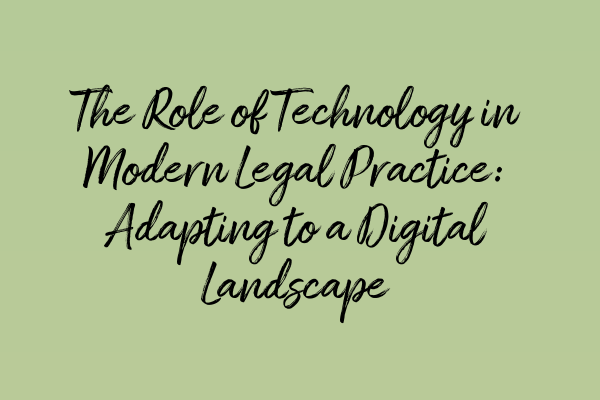The Role of Technology in Modern Legal Practice: Adapting to a Digital Landscape
In today’s increasingly digital world, technology has become an integral part of every industry, and the legal profession is no exception. The use of technology in legal practice has revolutionized the way solicitors work, enabling them to streamline processes, enhance efficiency, and better serve their clients. In this blog post, we will explore the various ways in which technology has impacted the legal landscape and the benefits it offers to both solicitors and their clients.
One of the key areas where technology has made a significant impact is in the realm of legal research. Gone are the days when solicitors had to spend hours digging through piles of books and documents to find relevant case law and legal statutes. With the advent of online legal research platforms and databases, solicitors can now easily access a wealth of legal information at the click of a button. These platforms not only provide a vast repository of legal resources but also offer advanced search functionalities that allow solicitors to quickly find the most relevant information for their cases.
Moreover, technology has facilitated the collaboration and communication between solicitors and their clients. With the rise of email, instant messaging, and video conferencing tools, solicitors can now easily communicate with their clients even if they are located in different parts of the world. This has not only made legal representation more accessible to clients but has also enabled solicitors to offer a more personalized and efficient service.
Another area where technology has had a transformative impact is case management. Traditionally, solicitors would have to rely on physical documents and files to keep track of their cases. However, with the introduction of sophisticated case management systems, solicitors can now store and organize all relevant case information digitally, making it easier to retrieve and analyze data. These systems also often include automation features, such as document assembly and deadline reminders, which further streamline the litigation process and reduce the chances of errors.
Furthermore, technology has paved the way for innovative forms of dispute resolution, such as online mediation and arbitration platforms. These platforms provide an alternative to traditional court proceedings and offer a faster and more cost-effective way of resolving disputes. With the ongoing COVID-19 pandemic, the importance of these virtual dispute resolution platforms has become even more pronounced, as they allow solicitors to continue representing their clients without the need for physical courtrooms.
However, it is important to note that while technology brings numerous advantages to the legal profession, it also presents challenges that solicitors must navigate. One such challenge is the need to maintain client confidentiality and protect sensitive information in the digital age. Solicitors must ensure that appropriate security measures are in place to safeguard client data and prevent unauthorized access. This might include using encrypted communication channels, implementing strong password policies, and regularly updating software and systems to address any vulnerabilities.
In conclusion, the role of technology in modern legal practice cannot be overstated. It has revolutionized the way solicitors work, enhancing efficiency, and improving client service. From online legal research platforms to digital case management systems and virtual dispute resolution platforms, technology has paved the way for a more accessible, efficient, and innovative legal profession. However, solicitors must also remain vigilant in addressing the challenges that come with technology, particularly in relation to client confidentiality and data security. By embracing technology and adapting to the digital landscape, solicitors can better serve their clients and stay ahead in an ever-evolving legal world.
Related Articles:
– Private Prosecutions: Exploring Non-Governmental Prosecutions in Criminal Cases
– Understanding Drug-related Offences: Laws and Penalties in the UK
– Criminal Defence Strategies: Expert Approaches to Protecting Clients’ Interests
– Demystifying Criminal Law Procedures: A Step-by-Step Guide
– Rights of the Accused: Protecting Individual Liberties in Criminal Proceedings


Leave a Reply